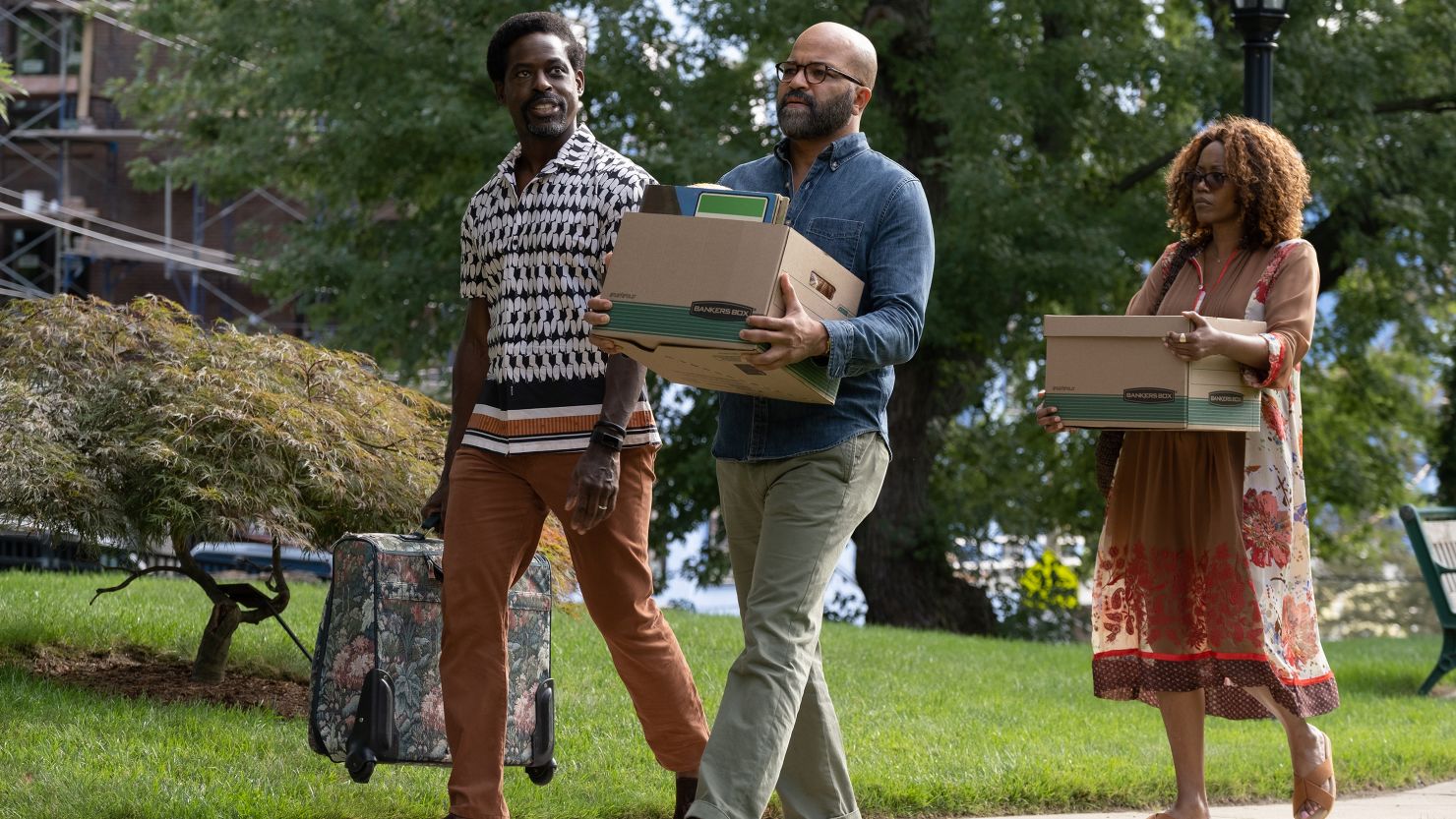Cord Jefferson’s directorial debut, American Fiction, has slowly but surely, quietly but confidently, been picking up buzz throughout awards season. At the time of writing, the team behind the film can celebrate earning five Oscar nominations, too, and most of them are thoroughly deserved. I managed to go into the movie fairly blind, and the experience was all the better for it, too. But that’s not because American Fiction is stacked with plot twists or big reveals. No, it is simply because Jefferson has delivered such a surprisingly charming and entertaining film that you will find it impossible to leave the theater without a smile on your face.
American Fiction is the story of Monk, real name Thelonious Ellison (Jeffrey Wright). Monk is a fairly well-respected author but has struggled to put his name to a hit novel for quite some time. He is forced to take a mandatory break from his role as a college professor, and ends up spending a little bit more time with his family back in Boston than he would have originally liked. But, while connecting with his mother, sister, and brother, the lives of the Ellison family slowly start to fall apart around him and Monk is the one who has to pick up the pieces. While under that immense pressure, Monk also tries to forge a romantic relationship with a neighbor, Coraline (Erika Alexander) and inadvertently writes a modern masterpiece with his attempt at a parody of the experience of a Black American man.
First of all, Jefferson and his fellow writer, Percival Everitt, have crafted a very, very good script here. American Fiction treads a fine line between offering a very organic depiction of everyday life and familial dynamics, while also ensuring that every single word earns its place on the page and the screen. It’s not an easy task to write a script that feels so natural, yet has been so meticulously and intentionally pieced together with the goal of truly having something to say, while also being exceptionally funny, too.
It is in these humorous moments that American Fiction flourishes. Genuinely funny films are hard to find these days, but this contains plenty of laugh-out-loud moments, mainly thanks to either Jeffrey Wright’s playful contempt for those around him or the painfully unaware actions of those trying so hard to make the world a better place through their misguided, insincere tokenism. But, in the same way, every dramatic moment serves a purpose, every instance of comedy in American Fiction goes a long way to developing the narrative and the thematic intentions of the movie. This is not a film that is funny for the sake of being funny, American Fiction is laced with purpose, and it really wants you to think about why you are laughing.
Of course, no amount of great writing can fulfill its potential without the work of exceptional actors, and American Fiction is lucky enough to be brought to life by an ensemble cast at the top of their game. Wright, who has received his first Oscar nomination for this role, is a man who brings such a gravitas and endearing quality to Monk that it’s so incredibly hard not to root for him, even when he is pushing people away. Alongside him, it’s very nice to see Sterling K. Brown getting his flowers for his performance as Cliff, Monk’s brother. Brown not only shines in this comedic environment but manages to fill his scenes with a very subtle, very effective range of emotion, too. The strong women in the film, from Monk’s mother (Leslie Uggams) to his sister (Tracee Ellis Ross), and their housekeeper Lorraine (Myra Lucretia Taylor), all provide such an authentic and, for the most part, very warm family environment, that you genuinely believe the connection the characters share. Even the smaller cameos are perfectly implemented, but special credit should go to Adam Brody, who clearly has a knack for being a bit of a scene stealer now (see also Promising Young Woman, and Ready or Not).
However, as strong as much of the cast is, it would have been nice to see certain relationships fleshed out further. The relationship between Monk and Coraline is sweet enough, but I fear we don’t see quite enough of their chemistry and their conflicts to buy into the connection or lack thereof. Similarly, Cliff is such an imposing character every time he is on screen, but while the hints of a rift between him and Monk are certainly there, Jefferson never entirely picks at that particular wound. Yes, one of the many points the film is looking to imprint on its audience is this notion of recognizing how important any kind of relationship can be and making the most of those attachments before it’s too late, so distance is a necessity. Still, there is a nagging feeling that we never quite cut to the core of all the issues at play.
At least the key concept of the movie is handled superbly. American Fiction is a shrewd commentary on the way we perceive and value art, and a fascinating takedown of the world of artistic criticism, too. Every step of the way, the film reminds us that performative establishments and, essentially, powerful white people are desperate to deflect and make amends for years of gatekeeping and racial profiling, but in doing so, these people are unconsciously reinforcing their own stereotypical views. In the film, the literary world is so eager to give Black writers a voice, but only if it’s exactly the kind of Black story that white people will want. What is clever in Jefferson’s work here, though, is that for all its meta-commentary, the film itself never falls into the trap of being pretentious or a caricature of the very thing it is condemning.
American Fiction is ultimately a good film, but not a great one. It’s a movie that is littered with brilliant moments, exceptionally sharp and funny dialogue, and really strong performances, but it is not without its limitations. Small details hold American Fiction back from really excelling, be it the slightly jarring musical score, or the lack of depth in certain character interactions. Still, it’s a nice, surprisingly sweet and entertaining directorial debut; it’s just not a film I would be in a rush to watch a second time, sadly.






